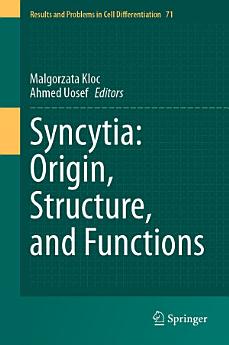Syncytia: Origin, Structure, and Functions
eBook 정보
The book covers the following topics:
- germline syncytia, evolution, function and structure;
- syncytia in embryogenesis and development;
- the role of somatic cell fusion in fungi, specialized somatic tissues, host defense and adaptation;
- syncytia induced by viruses and parasites;
- syncytia and circulating hybrid cells in cancer and other pathological conditions;
It also discusses how the genomic adaptations of microorganisms to extreme habitats can prompt the evolution of mononuclear and multinucleate/syncytial cells.
The book offers a fresh outlook on syncytia's role in various processes: embryogenesis, organogenesis, adaptation, host defense, and development of specialized tissues. It highlights the importance of syncytia under physiological and pathological conditions.
저자 정보
Malgorzata Kloc: Prior to completing her postdoctoral training in Canada, Dr. Kloc was a tenured Associate Professor in the Department of Zoology at the University of Warsaw, Poland. She also served as a Research Associate in the Department of Biology at Carleton University in Ottawa, Canada. While completing her postdoctoral training, Dr. Kloc earned the AHFMR Research Award from the University of Calgary and the MRC Biotechnology Training Award from Dalhousie University. She joined the University of Texas M.D. Anderson Cancer Center as a Research Scientist in the Department of Molecular Genetics in 1987, and became an Associate Professor in the Department of Biochemistry and Molecular Biology there in 2006. Dr. Kloc joined the Houston Methodist Research Institute in 2008. Currently, Dr. Kloc is the Weill Cornell Professor of Cell and Molecular Biology at The Houston Methodist Hospital and the Adjunct Professor at Department of Genetics, University of Texas, MD Anderson Cancer Center.
Ahmed Uosef finished his medical degree (MD) at the Ain Shams University Faculty of Medicine in Egypt in 2016. Since 2016 he participated in the clinical rotations at the Houston Methodist Hospital Surgical Liver ICU, gastroenterology at Baylor College of Medicine, St. Luke's Center, Houston, TX, Cardiovascular and Thoracic Surgery at Texas Heart Institute, St. Luke's Medical Center, Houston, TX. Presently he is a postdoctoral fellow at the Houston Methodist Hospital and Houston Methodist Academic Institute, Houston, TX, USA. During his postdoctoral work he has been involved in the basic and translation research on the role of macrophages in the development of chronic rejection of transplanted organs. His interests focus on the molecular and organellar aspects, and the involvement of the actin cytoskeleton and RhoA pathway in shaping macrophage response to the immune challenges.











